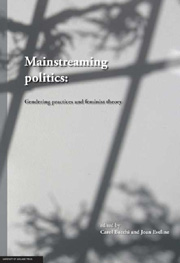Book contents
- Frontmatter
- Contents
- Preface
- Personal reflection
- Publisher's note
- List of authors and project personnel
- Acknowledgements
- Introduction
- 1 Gender/ing impact assessment: Can it be made to work?
- 2 Mainstreaming and neoliberalism: A contested relationship
- 3 Gender analysis and social change: Testing the water
- 4 What are we mainstreaming when we mainstream gender?
- 5 Approaches to gender mainstreaming: What's the problem represented to be?
- 6 Power, resistance and reflexive practice
- 7 Gender mainstreaming: The answer to the gender pay gap?
- 8 Gender analysis and community participation: The role of women's policy units
- 9 The invisibility of gendered power relations in domestic violence policy
- 10 Gender mainstreaming versus diversity mainstreaming: Methodology as emancipatory politics
- 11 University-public sector research collaboration: Mine the space, never mind the gap
- 12 Obeying organisational ‘rules of relevance’: Gender analysis of policy
- 13 Gender mainstreaming or diversity mainstreaming? The politics of ‘doing’
- Conclusion A politics of movement
- Author Index
- General Index
11 - University-public sector research collaboration: Mine the space, never mind the gap
Published online by Cambridge University Press: 05 June 2012
- Frontmatter
- Contents
- Preface
- Personal reflection
- Publisher's note
- List of authors and project personnel
- Acknowledgements
- Introduction
- 1 Gender/ing impact assessment: Can it be made to work?
- 2 Mainstreaming and neoliberalism: A contested relationship
- 3 Gender analysis and social change: Testing the water
- 4 What are we mainstreaming when we mainstream gender?
- 5 Approaches to gender mainstreaming: What's the problem represented to be?
- 6 Power, resistance and reflexive practice
- 7 Gender mainstreaming: The answer to the gender pay gap?
- 8 Gender analysis and community participation: The role of women's policy units
- 9 The invisibility of gendered power relations in domestic violence policy
- 10 Gender mainstreaming versus diversity mainstreaming: Methodology as emancipatory politics
- 11 University-public sector research collaboration: Mine the space, never mind the gap
- 12 Obeying organisational ‘rules of relevance’: Gender analysis of policy
- 13 Gender mainstreaming or diversity mainstreaming? The politics of ‘doing’
- Conclusion A politics of movement
- Author Index
- General Index
Summary
Introduction: Carol Bacchi and Joan Eveline
This chapter offers additional reflections on the ‘learnings’ that emerged from the Gender Analysis Project. With a particular focus on the South Australian experience, it outlines how the shared practice of collaborative discussion within the project's reference group (which consisted of the university research team; representatives of the industry partner, Office for Women; and representatives of the three participating agencies) encouraged reflexivity among participants. Reflexivity here refers to an ability and willingness to examine one's own presuppositions and to take on board novel perspectives. Becoming reflexive, we argue throughout, is a subjectivising effect of the practices in which we engage. Practices that focus on shared, interpersonal exchange and discussion promote the production of reflexive modes of being and thinking. That is, practices that foster a heuristic approach (learning by doing) in tough interactions with similarly committed but questioning colleagues, can promote reflexivity.
The Gender Analysis Project in South Australia brought together feminist researchers and policymakers, mainly women, who shared a commitment to redressing gender inequality, although not everyone would have agreed about what exactly this entailed. The concept of ‘mining the space’ in the title refers to the determination of group members to work through differing perspectives and to overcome blockages within an institutionally sanctioned space.
The chapter describes how the regular meetings of the reference group set up to oversee the project created the space and time required to examine and debate the contested meanings of gender and gender relations.
- Type
- Chapter
- Information
- Mainstreaming PoliticsGendering Practices and Feminist Theory, pp. 263 - 282Publisher: The University of Adelaide PressPrint publication year: 2010

